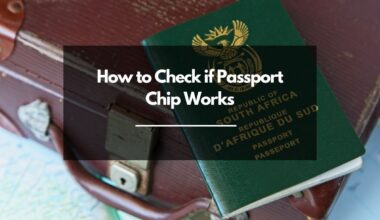As an Amazon Associate, I earn a small commission from qualifying purchases. Learn more about this.
Whether you’re a seasoned globetrotter or someone who’s just received their very first passport, understanding what your passport can and can’t reveal about your travel experiences is important.
Does Passport Show Travel History?
First and foremost, it’s important to clarify that your passport itself isn’t designed to provide a comprehensive record of your travel history.
Sure, when you cross an international border, immigration officers usually scan and stamp your passport with details about the date and place of entry.
These stamps can give a general idea of your past destinations, but they don’t necessarily provide a complete picture.
Here’s why: Not all countries stamp passports upon entry and exit.
For instance, the 26 countries in the Schengen area of Europe have abolished passport stamps at their mutual borders. This means that if you’re traveling between these countries, your passport won’t be stamped each time you cross a border.
Moreover, there can be instances where an immigration officer may forget to stamp a passport, or you might have to renew your passport, which results in losing previous stamps.
Furthermore, currently, many countries are moving towards electronic systems for tracking entries and exits.
Take the United States, for example, which now uses an electronic I-94 form for documenting arrivals and departures of foreign visitors.
So, while your passport can give a snapshot of your travels, it’s not a definitive record.
Can You Get rid of the Travel History From Your Passport?
When we talk about physically removing travel history from your passport – it’s a solid no. Passport stamps and visas are legal documents.
They represent the entry and exit records in different countries.
Altering these in any way, such as trying to remove them, is considered illegal in almost all jurisdictions worldwide. If caught, you could face serious penalties, including fines and possible bans from countries.
However, some might consider a more indirect route: obtaining a new passport.
When you replace or renew your passport, the new one doesn’t carry over the stamps or visas from your old passport. It’s a fresh booklet, a clean slate of sorts. But does this truly wipe your travel history?
The answer is still no.
The shift towards digital systems in immigration practices means that your entries and exits are recorded in databases that span years, and sometimes even decades.
This travel history isn’t tied to your physical passport alone, but to your personal identifiers like name, date of birth, and nationality. So even with a new passport, your travel history remains accessible to immigration authorities.
Read Also: Does Passport Show Criminal Record?
Common Passport Tips When Travelling
1. Ensure your passport’s validity
Many countries require your passport to be valid for at least six months beyond your planned date of departure.
If your passport is nearing its expiration date, it’s best to renew it well in advance of your travel dates.
2. Keep photocopies of your passport’s identification page stored securely, digitally.
This is important because if your passport gets lost or stolen, having a copy can speed up the process of getting an emergency passport from your embassy or consulate.
However, be cautious about where you store these copies to prevent identity theft.
3. Check the Visa requirements for your destination country.
Some countries might require a visa in advance, while others might provide one upon arrival or even have a visa waiver agreement with your country.
Make sure you know what is needed before you arrive to avoid any unpleasant surprises at immigration.
4. Protect your passport from physical damage
A damaged passport – with torn pages or unreadable details – can lead to trouble at border controls. Investing in a sturdy passport cover might be a good idea to keep it safe from wear and tear.
You also want to always keep your passport safe and secure while traveling.
Never leave it unattended in your hotel room or in a vehicle. Use a hotel safe if available or keep it on your person using a money belt or a secure pocket.
Conclusion
Generally, the question of ‘Does a passport show travel history?’ doesn’t have a simple ‘yes’ or ‘no’ answer. The truth is more nuanced, tied closely to the policies and procedures of individual countries and the evolving technologies used in border control.







